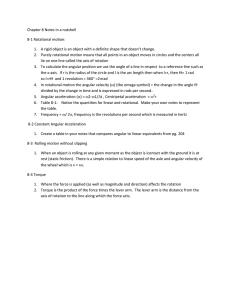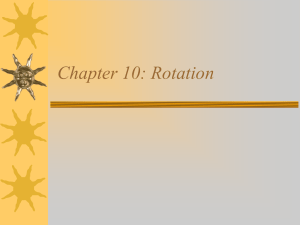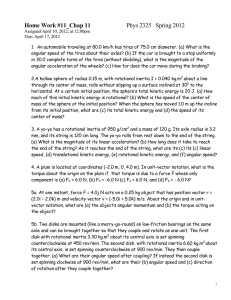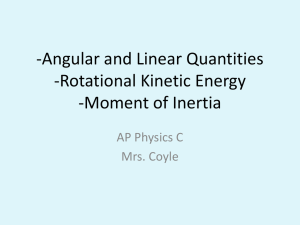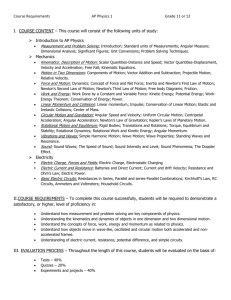Chapter 10 Rotational Kinematics and Energy
advertisement
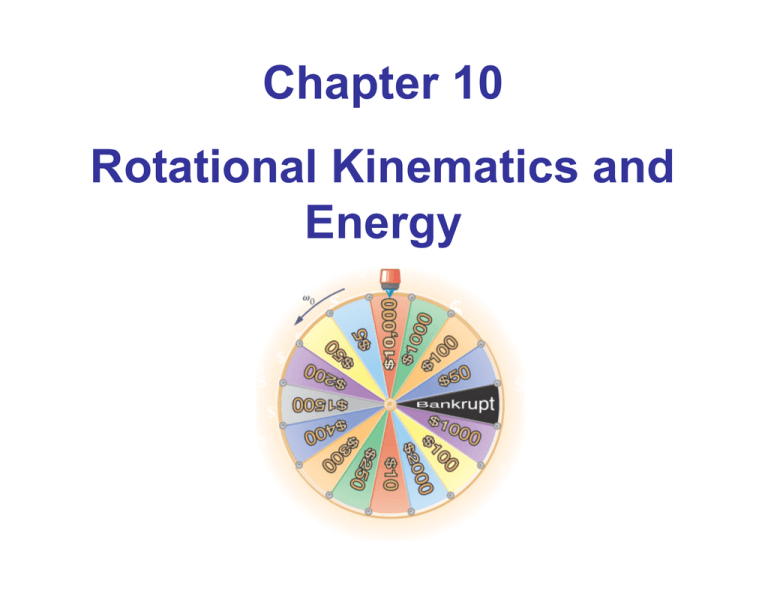
Chapter 10 Rotational Kinematics and Energy Units of Chapter 10 • Angular Position, Velocity, and Acceleration • Rotational Kinematics • Connections Between Linear and Rotational Quantities •Rolling Motion • Rotational Kinetic Energy and the Moment of Inertia • Conservation of Energy 10-1 Angular Position, Velocity, and Acceleration 10-1 Angular Position, Velocity, and Acceleration Degrees and revolutions: 10-1 Angular Position, Velocity, and Acceleration Arc length s, measured in radians: 10-1 Angular Position, Velocity, and Acceleration 10-1 Angular Position, Velocity, and Acceleration 10-1 Angular Position, Velocity, and Acceleration 10-1 Angular Position, Velocity, and Acceleration 10-2 Rotational Kinematics If the angular acceleration is constant: 10-2 Rotational Kinematics Analogies between linear and rotational kinematics: 10-3 Connections Between Linear and Rotational Quantities 10-3 Connections Between Linear and Rotational Quantities 10-3 Connections Between Linear and Rotational Quantities 10-3 Connections Between Linear and Rotational Quantities This merry-go-round has both tangential and centripetal acceleration. 10-4 Rolling Motion If a round object rolls without slipping, there is a fixed relationship between the translational and rotational speeds: 10-4 Rolling Motion We may also consider rolling motion to be a combination of pure rotational and pure translational motion: 10-5 Rotational Kinetic Energy and the Moment of Inertia For this mass, 10-5 Rotational Kinetic Energy and the Moment of Inertia We can also write the kinetic energy as Where I, the moment of inertia, is given by 10-5 Rotational Kinetic Energy and the Moment of Inertia Moments of inertia of various regular objects can be calculated: 10-6 Conservation of Energy The total kinetic energy of a rolling object is the sum of its linear and rotational kinetic energies: The second equation makes it clear that the kinetic energy of a rolling object is a multiple of the kinetic energy of translation. 10-6 Conservation of Energy If these two objects, of the same mass and radius, are released simultaneously, the disk will reach the bottom first – more of its gravitational potential energy becomes translational kinetic energy, and less rotational. Summary of Chapter 10 • Describing rotational motion requires analogs to position, velocity, and acceleration • Average and instantaneous angular velocity: • Average and instantaneous angular acceleration: Summary of Chapter 10 • Period: • Counterclockwise rotations are positive, clockwise negative • Linear and angular quantities: Summary of Chapter 10 • Linear and angular equations of motion: Tangential speed: Centripetal acceleration: Tangential acceleration: Summary of Chapter 10 • Rolling motion: • Kinetic energy of rotation: •Moment of inertia: • Kinetic energy of an object rolling without slipping: • When solving problems involving conservation of energy, both the rotational and linear kinetic energy must be taken into account.
